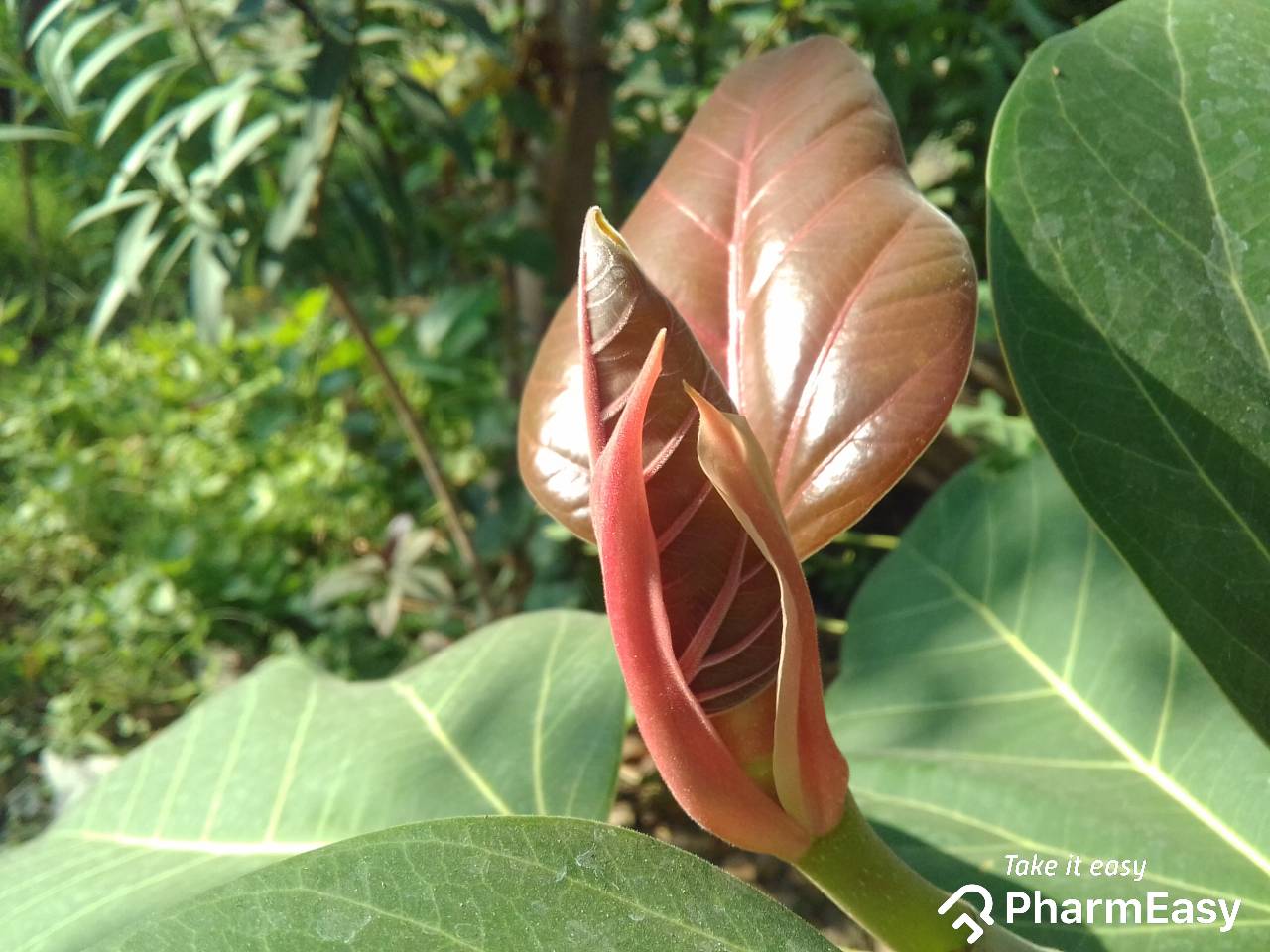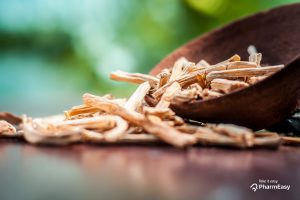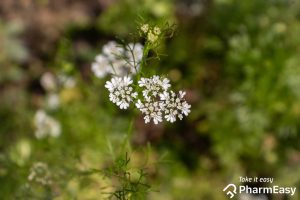Table of Contents
Introduction
Banyan tree, scientifically known as Ficus benghalensis, is a large and evergreen tree belonging to the Moraceae family. It is called Bargad in Hindi and Urdu, Banyan, East Indian Fig and Indian Fig in English and Bahupada or Vat in Sanskrit. It is one of the most important trees in Indian history. It is the national tree of India. It is grown in India, Pakistan and Sri Lanka.1 It is a woody tree with a long lifespan.2 All parts of the Banyan tree: fruits, leaves, roots and barks are used in ethnomedicine.3
Nutritional Value and Chemical Constituents of Banyan Tree:
Chemical constituents:

| Plant part | Chemical constituents |
| Leaf | Flavonoids, terpenoids, phenols and terpenes |
| Bark | Flavonoids, terpenoids, phenols, terpenes, quinone, furanocoumarin |
| Root | Sterols, amino acids, fatty acids |
| Fruits | Fatty acids |
The seeds of the Banyan tree are a rich source of carbohydrates and proteins. In addition, the seeds also contain lipids, fibre, Vitamin C and Vitamin E. The nutritional value of these seeds is around 130 calories per 100 grams.
The seeds also contain minerals like sodium, potassium, calcium, manganese, Iron, chromium, copper and phosphorous.5
Also Read: Shikakai – Uses, Benefits, Side Effects & More!
Therapeutic Uses
- In the traditional system of medicine, the Banyan tree’s stem bark, aerial roots, leaves, fruits, underground roots, vegetative buds and latex are used in various nervous disorders like anxiety, insomnia and seizures.6
- Parts of the Banyan tree are used in the preparation of Ayurvedic medicines.
- The roots and stem barks are used in the form of decoction to manage skin disorders, diarrhoea, dysentery, diabetes, and inflammation.
- Leaves of Banyan are used as a remedy for leucorrhea and vaginal discharge. The leaves can be consumed to boost the immune system.
- The latex produced by the Banyan tree is used as a blood purifier in urinary and urinogenital disorders.
- The seeds of Banyan are prescribed as dietary supplements to people with peptic ulcers.4
Benefits of Banyan
1. Benefits of Banyan in Diabetes
The antidiabetic properties of Banyan bark extract have been proven in many animal studies. Oral administration of bark extract has shown blood glucose reducing benefits by stimulating insulin secretion in animal models. The leaf extract of Banyan has also shown antidiabetic properties in in-vivo studies. The leaf extract reduced the blood glucose levels in a rat model, signifying the traditional use of leaves as antidiabetic agents.4
Read More: All You Need To Know About Diabetes!
2. Benefits of Banyan in Inflammation
- Benefits of Banyan in Wound Healing
Because of the anti-inflammatory benefits ofFicus benghalensis, it is widely used in wound healing. The roots and leaves extract showed wound healing benefits in animal studies. Leaf extract was able to accelerate the wound healing process. The root extract could also promote wound healing.4
- Benefits of Banyan in Ulcers
As per animal studies, the leaf extract also showed anti-ulcer characteristics. The leaf extract could also reduce the damage in the mucosa.4
- Benefits of Banyan in Arthritis
The bark extract of Banyan also showed anti-arthritic activity.4
3. Benefits of Banyan in Cancer
The extract of latex produced by the Banyan tree, when screened for anticancer activity on cell lines, showed anticancer benefits against colorectal and breast cancer cell lines. The aerial root extract of the Banyan tree showed potential anticancer benefits against lung, breast, and cervical cancer.4
4. Benefits of Banyan for Liver
Oral administration of the latex produced by the Banyan tree showed liver-protective benefits in rats. The latex treatment improved liver function. The fruit extract also showed reduced liver toxicity in laboratory studies. The antioxidant compounds present in the fruits might have contributed to the liver-protective action. The coumarins present in Banyan fruit also possess liver protective activity.4
5. Benefits of Banyan for Immunity
Immunomodulation means controlling the activity of the immune system by stimulating or suppressing its function. The leaf extract showed immunomodulatory action by stimulating neutrophils (cells involved in the immune response). The aerial root extract stimulated the production of antibodies in the blood. The extract could also increase the immune response.4
Read More: 13 Immunity-Boosting Foods To Build A Healthy Life
6. Benefits of Banyan for Brain
Oral administration of aerial root extract of Banyan tree may have anxiety-reducing, muscle relaxing, memory enhancing and seizure modifying benefits, as indicated by animal studies.6 The fruit and bark extract of Banyan could aid in relieving stress.4
7. Benefits of Banyan Against Microbes
Banyan root extract showed inhibition of the growth of bacteria. The aerial root extract has also demonstrated antibacterial activity. Other parts of the Banyan tree, such as leaf, root and fruit extracts, have also shown antibacterial benefits.4
How to Use Banyan?
The following parts of Banyan can be used:
- Root and stem bark can be used as a decoction.
- Leaf
- Latex.4
Your Ayurvedic physician will prescribe you the form and dose as per your requirement.
Precautions to Take With Banyan
The fresh fruits of Banyan are not to be consumed by humans because of the laxative effect.4
Also Read: Arogyavardhini Vati: Uses, Benefits, Side Effects & More!
Frequently Asked Questions
1. What is the lifespan of the Banyan tree?
Banyan trees have a long lifespan, which is more than 100 years.2
2. What is Banyan?
The Banyan tree is a large, fast-growing and evergreen tree.1
3. What is the scientific name of the Banyan tree?
The scientific name of the Banyan tree is Ficus benghalensis. It belongs to the Moraceae family.1
4. What parts of the Banyan tree can be used?
All the parts of the Banyan tree, including roots (aerial and underground), bark, leaves, fruits and latex, are used in traditional medicine.6
5. Does the Banyan tree have uses in medicine?
Yes, the Banyan tree has uses in traditional and folk medicine. It is also used in the pharmaceutical industry.2
6. Does the Banyan tree have health benefits?
Banyan tree parts such as fruits, leaves, roots, and barks are used in ethnomedicine. These parts have many health benefits for the brain and liver. These parts also have immunomodulating properties. These are beneficial in many diseases as well, like diabetes and inflammation.4
7. What are the benefits of Banyan in wound healing?
The anti-inflammatory action of the extracts of leaves and roots helps in wound healing. The wound healing properties have been tested in animal studies and are yet to be confirmed in humans through trials.4
Also Read: Chandraprabha Vati: Uses, Benefits, Side Effects, Precautions & More!
References
1. Ficus benghalensis L. | Species [Internet]. [cited 2022 Mar 16]. Available from: https://indiabiodiversity.org/species/show/31316#overview
2. Ficus benghalensis (banyan) [Internet]. [cited 2022 Mar 16]. Available from: https://www.cabi.org/isc/datasheet/24066
3. Banyan (Ficus benghalensis) | Feedipedia [Internet]. [cited 2022 Mar 16]. Available from: https://www.feedipedia.org/node/155
4. Murugesu S, Selamat J, Perumal V. Phytochemistry, Pharmacological Properties, and Recent Applications of Ficus benghalensis and Ficus religiosa. Plants [Internet]. 2021 Dec 1 [cited 2022 Mar 16];10(12). Available from: https://pmc/articles/PMC8707271/
5. Determination of nutritive value and mineral elements of Ficus benghalensis linn. seed [Internet]. [cited 2022 Mar 16]. Available from: https://www.researchgate.net/publication/282284290_Determination_of_nutritive_value_and_mineral_elements_of_Ficus_benghalensis_linn_seed
6. Panday DR, Rauniar GP. Effect of root-extracts of Ficus benghalensis (Banyan) in memory, anxiety, muscle co-ordination and seizure in animal models. BMC Complementary and Alternative Medicine [Internet]. 2016 Nov 3 [cited 2022 Mar 16];16(1). Available from: https://pmc/articles/PMC5094015/
Disclaimer: The information provided here is for educational/awareness purposes only and is not intended to be a substitute for medical treatment by a healthcare professional and should not be relied upon to diagnose or treat any medical condition. The reader should consult a registered medical practitioner to determine the appropriateness of the information and before consuming any medication. PharmEasy does not provide any guarantee or warranty (express or implied) regarding the accuracy, adequacy, completeness, legality, reliability or usefulness of the information; and disclaims any liability arising thereof.
Links and product recommendations in the information provided here are advertisements of third-party products available on the website. PharmEasy does not make any representation on the accuracy or suitability of such products/services. Advertisements do not influence the editorial decisions or content. The information in this blog is subject to change without notice. The authors and administrators reserve the right to modify, add, or remove content without notification. It is your responsibility to review this disclaimer regularly for any changes.



 By
By 










Comments